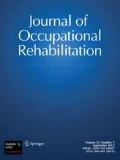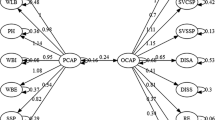Abstract
Introduction The concept of “work ability” is central for many sciences, especially for those related to working life and to rehabilitation. It is one of the important concepts in legislation regulating sickness insurance. How the concept is defined therefore has important normative implications. The concept is, however, often not sufficiently well defined. Aim and Method The objective of this paper is to clarify, through conceptual analysis, what the concept can and should mean, and to propose a useful definition for scientific and practical work. Results Several of the defining characteristics found in the literature are critically scrutinized and discussed, namely health, basic standard competence, occupational competence, occupational virtues, and motivation. These characteristics are related to the work tasks and the work environment. One conclusion is that we need two definitions of work ability, one for specific jobs that require special training or education, and one for jobs that most people can manage given a short period of practice. Having work ability, in the first sense, means having the occupational competence, the health required for the competence, and the occupational virtues that are required for managing the work tasks, assuming that the tasks are reasonable and that the work environment is acceptable. In the second sense, having work ability is having the health, the basic standard competence and the relevant occupational virtues required for managing some kind of job, assuming that the work tasks are reasonable and that the work environment is acceptable. Conclusion These definitions give us tools for understanding and discussing the complex, holistic and dynamic aspects of work ability, and they can lay the foundations for the creation of instruments for evaluating work ability, as well as help formulate strategies for rehabilitation.
Similar content being viewed by others
Notes
Note that we will only be concerned with paid work, even though some of the requirements proposed could apply to unpaid work as well.
A discussion on the level of body functions and body structures would usually only be relevant for explaining the relative lack of health or work ability [24].
Note, however, that the ICF is supposed to encompass all aspects “of human health” [24, p. 7]. This means that it does not cover all the relevant aspects of work ability, since this concept, as we shall see, also includes non-health-related aspects of individuals, such as different kinds of competences and occupational virtues. The “personal factors” mentioned in the ICF do cover some of these aspects, but this area is not further explored in the ICF [24, p. 17].
Note that some virtues and character traits border on abilities and dispositions, and might be hard to differentiate from these. Perseverance is one such example, orderliness is another.
It is reasonable to assume that there is some match between the actual requirements and the norm, since this is one of the things that labor unions can negotiate, and governments legislate, about. However, we can also notice that the requirements in working life are becoming more demanding [21].
References
Fleishman EA, Reilly ME. Handbook of human abilities: definitions, measurements and job task requirements. Bethseda, MD: Management Research Institute, Inc; 1995.
DOT 2009. Dictionary of Occupational Titles. [Revised 2003 Apr 18; Cited 2009 Mar 3] Available from http://www.occupationalinfo.org/.
Nordenfelt L. The concept of work ability. Brussels: P.I.E. Peter Lang; 2008.
Kuoppala J, Lamminpää A, Husman P. Work health promotion, job well-being, and sickness absences—a systematic review and meta-analysis. J Occup Environ Med. 2008;50(11):1216–27.
Sandqvist JL, Henriksson CM. Work functioning: a conceptual framework. Work. 2004;23:147–57.
Boer WEL de. Quality of evaluation of work disability. Ph D Thesis. TNO: Hoofddorp, 2010.
Westerhäll L. Rättsliga aspekter på arbetsoförmåga på grund av sjukdom. [Legal aspects on work ability due to disease.] Socialmedicinsk tidskrift. 1997; 8–9: 356–365.
Swedish Government Bill, 1962:381. Lagen om allmän försäkring [The National Insurance Act]. Stockholm: Ministry of Social Affairs, 1962.
SOU 2008:66. Arbetsförmåga? En översikt av bedömningsmetoder i Sverige och andra länder [Work ability? A survey of assessment methods in Sweden and in other countries.] Stockholm: Socialdepartementet, 2008.
Socialstyrelsen [National Board of Health and Welfare] [Updated 2005; Cited 2005 Oct 21]. Available from http://www.sos.se/sosfs/1992_16/1992_16.htm.
SOU 1997:166. Ohälsoförsäkringen: Trygghet och aktivitet [Ill health insurance: Safety and activity]. Stockholm: Socialdepartementet, 1997.
Baggini J. Fosl PS. The philosopher’s toolkit. A compendium of philosophical concepts and methods. Oxford: Blackwell; 2003.
Audi R. Action, intention and reason. Ithaka, NY: Cornell University Press; 1993.
Nordenfelt L. On the nature of health: an action-theoretic approach, second revised edition. Dordrecht: Kluwer; 1995.
Tengland P-A. Begreppet arbetsförmåga [The Concept of Work Ability]. Linköpings Universitet: IHS Rapport, 2006:1.
Stanford Encyclopedia of Philosophy. [2008 Sep 17; Cited 2009 Dec 21] Available from http://plato.stanford.edu/entries/natural-kinds/
Carnap R. The logical foundation of probability. Chicago: University of Chicago Press; 1971.
Ayer AJ. The central questions of philosophy. London: Penguin Books; 1991.
Ilmarinen J. Functional capacities and work ability as predictors of good 3rd age. In: Shiraki K, Sagawa S, Mohamed Yousef K, editors. Physical fitness and health promotion in active ageing. Leiden, The Netherlands: Backhuys Publishers; 2001. p. 61–80.
Westerholm P, Bostedt G. Kan företagshälsovården lösa sjukskrivningskrisen? [Can the Industrial Health Service solve the crisis in sick-listing?]. In: Hogstedt C, Bjurvald M, Marklund S, Palmer E, Theorell T, editors. Den höga sjukfrånvaron—sanning och konsekvens. Stockholm: Statens folkhälsoinstitut; 2004. p. 303–44.
Brülde B. Arbetsförmåga: Begrepp och etik [Work ability: Concepts and ethics]. In: Vahlne Westerhäll L, editor. Arbets(o)förmåga—ur ett mångdisciplinärt perspektiv. Santérus förlag: Stockholm; 2008. p. 195–224.
Velozo CA. Work evaluations: critique of the state of the art of functional assessment. Am J Occup Ther. 1993;47:203–9.
Innes E, Straker L. A clinician’s guide to work-related assessments, 2—Design problems. Work. 1998;11:191–206.
ICF, International Classification of Functioning, Disability and Health. Geneva: World Health Organization; 2001.
Nordenfelt L. Action theory, disability and ICF. Disabil Rehabil. 2003;25:1075–9.
Boorse C. Health as a theoretical concept. Philosophy of Science. 1977;44:542–73.
Pörn I. An equilibrium model of health. In: Lindahl I, Nordenfelt L, editors. Health, disease and causal explanations in medicine. Dordrecht: Reidel; 1984. p. 3–9.
WHO. Official Records of the World Health Organization, 1948; 2, 100.
Tengland P-A. A two-dimensional theory of health. Theoretical Medicine and Bioethics. 2007;28(4):257–84.
UNICEF. Childhood under threat. The state of the world’s children [2005; Cited 2009 Dec 1] Available from http://www.unicef.org/sowc05/english/index.html
Nordenfelt L. On ability, opportunity and competence: an inquiry into people’s possibility for action. In: Holmström-Hintikka G, Toumela R, editors. Contemporary action theory, vol I. Dordrecht: Kluwer; 1997. p. 145–58.
Ryle G. Collected papers. New York: Barnes and Noble; 1971.
Dreyfus H, Dreyfus S. Mind over machine. New York: Free Press; 1986.
Culver CM, Gert B. Philosophy in medicine. Oxford: Oxford University Press; 1982.
Tengland P-A. Health promotion and disease prevention: logically different conceptions? Health Care Anal. 2009; doi:10.1007/s10728-009-0125-0.
Johansson G, Lundberg I. Adjustment latitude and attendance requirements as determinants of sickness absence of attendance, empirical tests of the illness flexibility model. Soc Sci Med. 2004;58:1857–68.
Brülde B. Långtidfrisk eller långtidssjukskriven? [Long-term healthy or long-term sick-listed?] Del 1 [Part 1]. Report 2005:02. University West.
Freud S. Orientering i Psykoanalysen [German original: Vorlesungen zur Einführung in die Psychoanalyse, and Neue Folge der Vorlesungen zur Einführung in die Psychoanalyse]. Natur och Kultur: Stockholm; 1955.
Maslow A. Motivation and personality. HarperCollins: New York; 1987.
Rachels J, Rachels S. The elements of moral philosophy. London: McGraw-Hill; 2006.
Cloninger CR, Svrakic DM, Przybeck TR. A psychobiological model of temperament and character. Arch Gen Psychiatry. 1993;50:975–90.
Järvholm B, Netz P. Arbetsförmåga [Work ability]. In: Järvholm B, Olofsson C, editors. Försäkringsmedicin [Insurance Medicine]. Lund: Studentlitteratur; 2002. p. 36–40.
Costa G, Goedhard WJA, Ilmarinen J. Assessment and promotion of work ability, health and well-being of ageing workers. International Congress Series. No. 1280. The Netherlands: Elsevier; 2005.
Acknowledgments
I would like to thank Lennart Nordenfelt, Kerstin Ekberg and the research group at FAR at Linköping University, Bengt Brülde, and Katarina Graah-Hagelbäck for valuable comments on earlier versions of this paper. This work has been financed by the Swedish Council for Working Life and Social Research.
Conflict of interest
The author declares that he has no competing interests.
Author information
Authors and Affiliations
Corresponding author
Rights and permissions
About this article
Cite this article
Tengland, PA. The Concept of Work Ability. J Occup Rehabil 21, 275–285 (2011). https://doi.org/10.1007/s10926-010-9269-x
Published:
Issue Date:
DOI: https://doi.org/10.1007/s10926-010-9269-x




